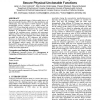Free Online Productivity Tools
i2Speak
i2Symbol
i2OCR
iTex2Img
iWeb2Print
iWeb2Shot
i2Type
iPdf2Split
iPdf2Merge
i2Bopomofo
i2Arabic
i2Style
i2Image
i2PDF
iLatex2Rtf
Sci2ools
169
click to vote
ISLPED
2010
ACM
2010
ACM
Low-power sub-threshold design of secure physical unclonable functions
The unique and unpredictable nature of silicon enables the use of physical unclonable functions (PUFs) for chip identification and authentication. Since the function of PUFs depends on minute uncontrollable process variations, a low supply voltage can benefit PUFs by providing high sensitivity to variations and low power consumption as well. Motivated by this, we explore the feasibility of sub-threshold arbiter PUFs in 45nm CMOS technology. By modeling process variations and interconnect imbalance effects at the post-layout design level, we optimize the PUF supply voltage for the minimum power-delay product and investigate the trade-offs on PUF uniqueness and reliability. Moreover, we demonstrate that such a design optimization does not compromise the security of PUFs regarding modeling attacks and side-channel analysis attacks. Our final 64-stage subthreshold PUF design only needs 418 gates and consumes 0.047pJ energy per cycle, which is very promising for low-power wireless sensing ...
Related Content
| Added | 06 Dec 2010 |
| Updated | 06 Dec 2010 |
| Type | Conference |
| Year | 2010 |
| Where | ISLPED |
| Authors | Lang Lin, Daniel E. Holcomb, Dilip Kumar Krishnappa, Prasad Shabadi, Wayne Burleson |
Comments (0)

